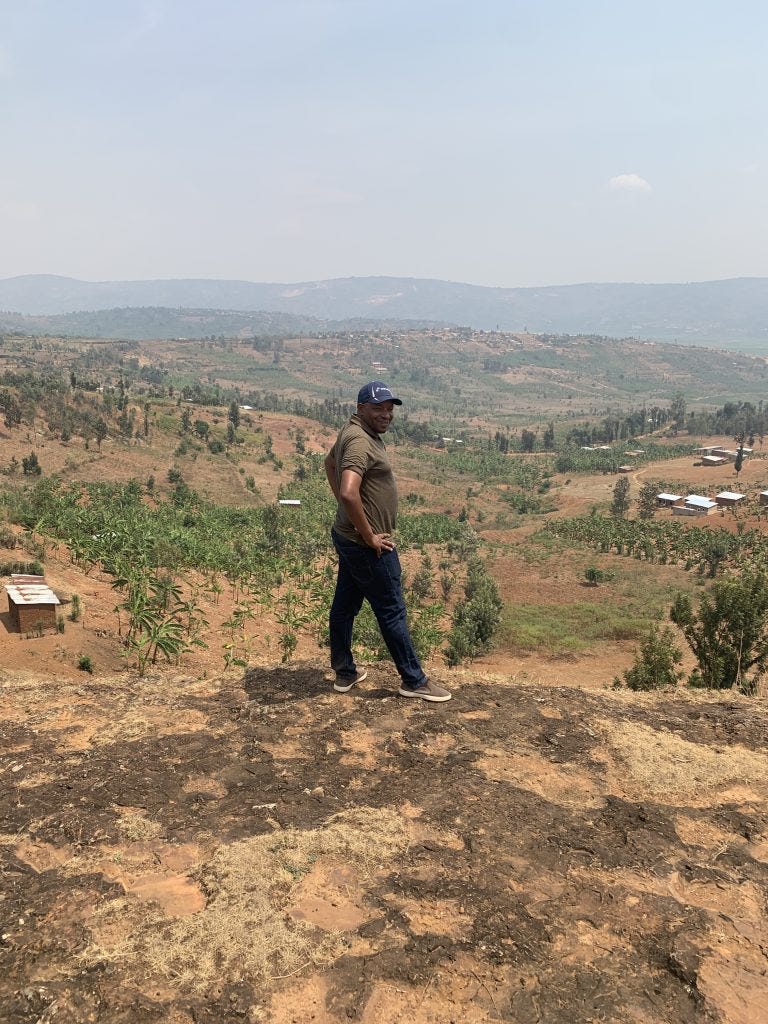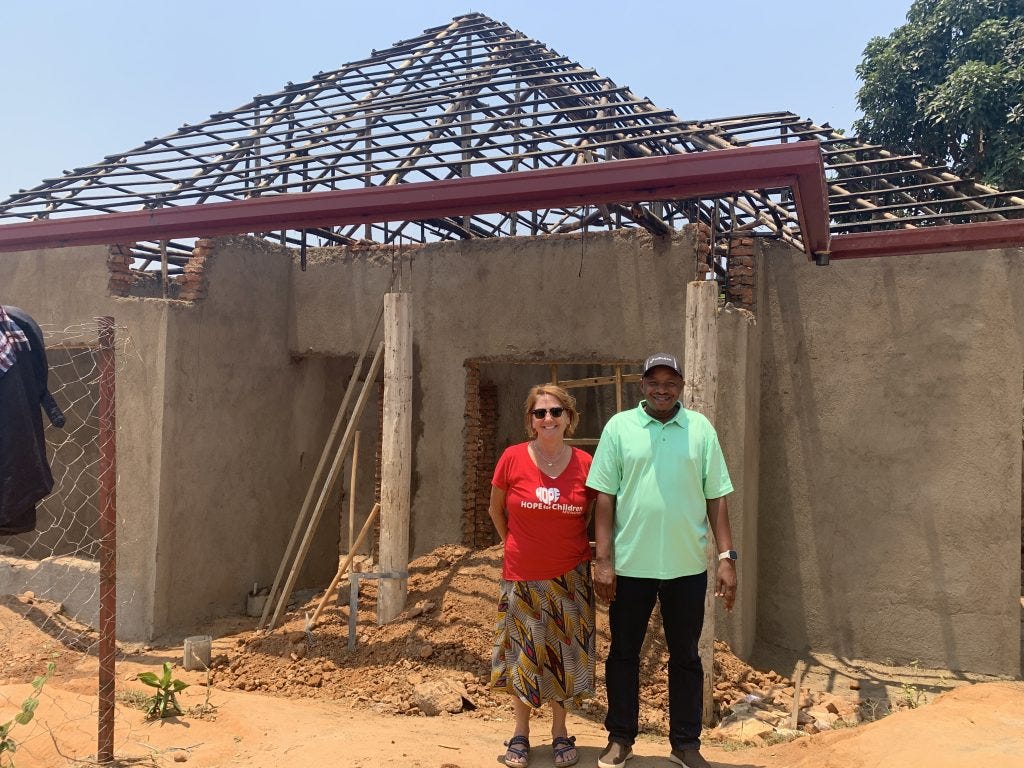Valerie Biel on “Connecting with a Rwandan Genocide Survivor”
Valerie Biel is the author of the award-winning Circle of Nine young adult series. Her latest book is Beyond the Cemetery Gate. You can find out more about Valerie on her website, www.valeriebiel.com.
NOTE: This post contains descriptions of horrific violence.
We recently returned from a trip to Rwanda, Tanzania, Uganda, and Kenya for The World Orphan Fund, the charity my husband and I started in 2010. I’ve written about these trips before, where we visit projects and evaluate new partnerships with children’s homes and programs. This trip had been a long time coming—our previous visit to Africa in 2020 ended just two weeks before the pandemic shut everything down. Thankfully, the projects we identified on that trip moved forward, and it was wonderful to see some of the children’s homes we’ve been supporting. (Learn more about The World Orphan Fund here).
But this post isn’t about that. It’s about the horrific massacre of over 600,000 Tutsis between April and July 1994, and more importantly, it’s about the resiliency, hope, faith, and kindness of one survivor.
As writers, we are observers of human behavior—sometimes horrified by the worst in people, yet also amazed by the goodness that persists in the world. I’m ashamed to admit that much of what I knew about the Rwandan genocide came from the movie Hotel Rwanda—which, I learned, is not something you want to bring up in Rwanda. I was told the man portrayed as a hero in that movie is not viewed that way by many Rwandans. Instead, I was directed to the film Shooting Dogs and provided a list of books on the subject. (See more below.)
While in Rwanda, I had the honor of meeting Yves Nymushanja. He’s an incredibly resilient man doing amazing things for vulnerable children in a land he once vowed never to return to. In 1994, at the age of 12, Yves and his family, as Tutsis, were hunted down by the Hutus. Yves is the only member of his family to survive—his parents, siblings, aunts, uncles, and cousins were all murdered. No one would blame him for not wanting to come back to Rwanda.
But he did come back. Along with Americans Julie and Alan Klosiewski, Yves started a ministry serving children through outreach programs and schooling. Some of those he helps are likely descendants of the very people who killed his family, but Yves makes no distinction in those he serves. He tells us that the ethnic identity between Hutus and Tutsis is no longer emphasized in Rwanda.
During our visit, Yves took us to the Ntamara Genocide Memorial, the church where he and his family sought sanctuary in 1994. He walked us through the events of that day. It was clear that recounting his story was painful, but he wanted us to understand what had happened.
When the Hutu attackers entered the church to kill the Tutsis hiding there, they used whatever weapons they had. Yves was left for dead, buried beneath the bodies of others, soaked in their blood. He stayed that way for hours, paralyzed by the weight of the bodies. Eventually, he crawled out to find his family. Yves showed us the kitchen where he found his mother and sisters—one already dead, while his mother and another sister were still alive. They were later joined by his father, who had been fighting off attackers. The family fled to another location, but the Hutus followed them there. Yves’ mother was killed, and Yves, his father, and his sister hid in the swamps for days. Eventually, soldiers swept through the area and killed his father and sister. Yves remained hidden, lying still as the soldiers passed just feet away.
The Ntamara Memorial now holds the mass grave of over 6,000 Tutsi people. Display cases show skulls, many clearly bearing signs of the violence they endured, alongside clothing and personal belongings. In the Sunday School room, the blood-stained brick wall remains, where babies and toddlers were murdered by being thrown against it.
Standing in that space, it was hard to breathe. I tried not to cry, though that would have been an understandable reaction. It reminded me of my visit to Auschwitz and our son’s reaction to the Killing Fields in Cambodia. Being confronted with the evidence of the horrible things human beings can and continue to do to each other out of fear, greed, hatred is overwhelming. I didn’t live through it, but Yves did, and all I could think about was 12-year-old Yves and what he endured.
Yves showed us his father’s name engraved on the memorial wall and took us down to the crypt where coffins rest on multi-tiered shelves. Each coffin holds multiple sets of remains.
I completely understood Yves’ initial vow never to return. But after much soul-searching, he realized he had been spared for a reason. He returned to Rwanda, started a school, and built a ministry for vulnerable children. His ability to not distinguish between Tutsi and Hutu descendants is astounding. His goal is to bring hope, education, and love to children, regardless of their background.
I try to put myself in Yves’ shoes, but I can’t. I don’t know if I could do what he’s doing, after living through what he did. His strength and his drive to bring hope to children is a special grace to witness.
As a writer, I process difficult subjects through writing. While I typically write fiction, I couldn’t have written a better ending for Yves’ story than the one he’s living now—endurance, resilience, faith, hope, and love.
Additional resources:
Reading list provided to me by staff at the Ntamara Genocide Memorial:
Intent to Deceive: Denying Genocide of the Tutsi by Linda Melvern
Cockroaches by Scholastique Mukasonga
Do Not Accept to Die by Dimitri Sissi Mukanyiligira
Season of Blood: A Rwandan Journey by Fergal Keane
A Broken Life by Judence Kayitesi
Valerie’s latest book, Beyond the Cemetery Gate, is available now from Amazon.com. This is an affiliate link.
Valerie Biel is the author of the award-winning Circle of Nine series (stories inspired by Celtic mythology and the stone circles of Ireland). Learn more about her on her website valeriebiel.com, or follow her on Twitter, Facebook, or Instagram.






Bless you, Val, your husband, and Yves for bringing some solace to our violent world by your charitable work that takes you to places and people scarred by human depravity. Your story is heartbreaking. Comparatively, my problems are minuscule and petty, and my life is soft and luxurious. Such a journey would sear and transform anyone with a heart and soul and push the brave, like you three, to create good from tragedy. Thank you for the work you do!
"He was spared for a reason." May he be an example of kindness, love, and forgiveness.